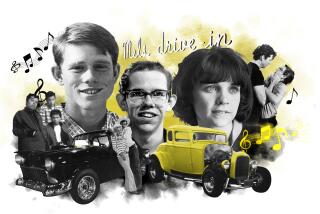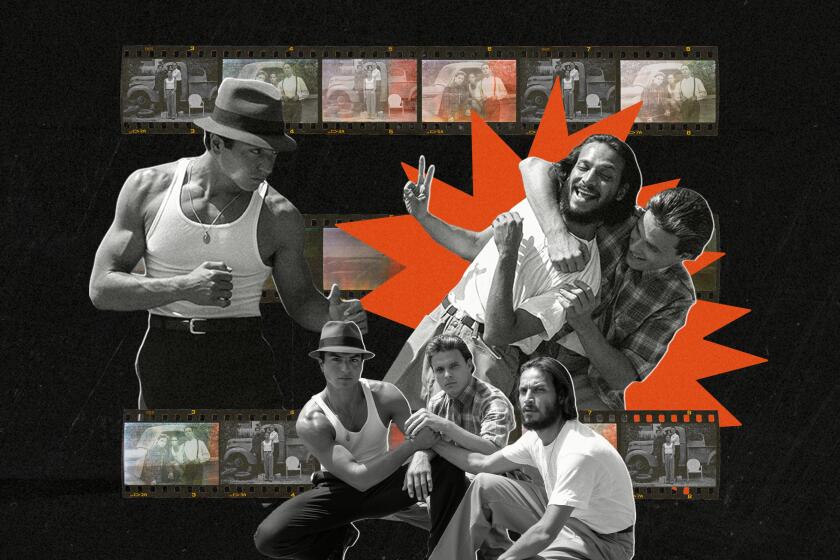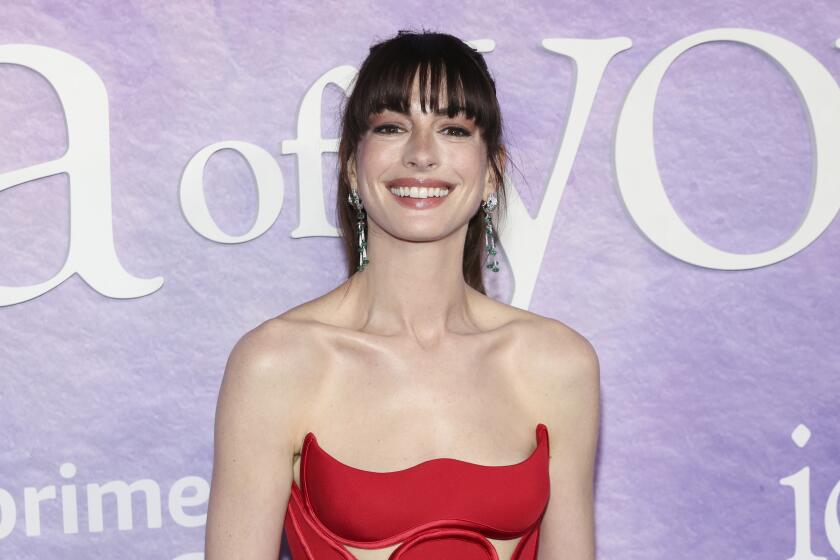‘Barnyard’ is udder nonsense
I understand that realism is not the main goal in an animated movie about anthropomorphized farm animals, but, seriously, what’s with the male cows in “Barnyard”? Did the bovine gender confusion at the heart of the story give no one pause at Paramount or Nickelodeon? Did the drawbacks of featuring a female lead so outweigh the benefits of cow protagonism that a mass species sex-change was required in order for the project to go forward? Are hornless, uddered boy-cows the next big thing in aggressively marketed, reality-displacing fallacies, like Snackwells and intelligent design?
I don’t pretend to know all the answers; all I can say for sure is that in writer-director Steve Oedekerk’s bizarre computer-animated universe, “female cows” are required to wear hair accessories in order to differentiate themselves from “male cows,” with whom they unaccountably share secondary sex characteristics. Otis the cow (voiced by Kevin James), his alpha cow dad, Ben (Sam Elliott), and the thuggish band of Jersey cows Otis teams up with toward the end of the movie are all in unfortunate possession of protuberant udders that look like rubber toilet plungers with four wobbly cocktail weenies attached. The image would be plenty disturbing enough if the characters didn’t compound the shock by going about on hind legs and engaging in lots of bouncy physical activity. Reader, there were times when I felt compelled to avert my eyes and pray for pants.
The crassness of the image, which we can assume was entirely unintentional, pales in comparison to the sad vulgarity of its characters and story. Pretty much all you need to know about “Barnyard” is summed up in its subtitle, “The Original Party Animals,” and in its tagline, “What happens in the barn, stays in the barn” -- a formulation you’ll no doubt recognize from the city of Las Vegas’ corporate-sanctioned debauchery consumer brand campaign. The movie opens on a bucolic farmyard dotted with cute country animals. The look is appealingly old-fashioned at first, luridly colorful and surreally deep, as though looked at through a View-Master. But as soon as the farmer goes off in his truck, the animals stand up and start acting like idiots. The premise is that when humans turn their backs animals revert to living lives very much like our own -- that is, they exist in a state of protracted, excitement-addled, media-saturated arrested development. That’s right, kids, when the farmer’s away, the moo-cows and oink-oinks come out to play like frat boys on the Strip. Whoo! Party!
There is one grown-up on the farm, namely Ben, an aggrieved manager type who is forever trying to round up the other animals into meetings. That’s just what leaders do. If Ben is all officiousness all the time, his son Otis is a Mountain Dew commercial made beef. When we first see Otis, he’s surfing down a nearby mountain on a board strapped to an ice cube. Whenever we see him after that, he’s golfing, parasailing, strapping on one of those funny hats that double as drink holders and watching sports on TV. When he finally shows up at Ben’s meeting, he’s covered in feathers. He greets the assembled animals with an insouciant “wassup” and takes a call from the underground gopher network confirming the arrival of his gray market Air Jordans. Childhood memories to cherish forever.
Not long into the film, Ben is attacked by a band of villainous coyotes, really scruffy sickos of the type favored by CBS police procedurals. But when the other animals ask Otis to assume Ben’s leadership responsibilities (although what they need leadership for, considering their only cultural imperative is to party, is unclear), Otis refuses and instead spends his time hanging around with his feckless Mexican mouse friend, ignoring the down-home wisdom of the Morgan Freeman character (an old mule voiced by Danny Glover), falling in love with the sweet, docile, cow-eyed Daisy (Courteney Cox) and braving the sassy put-downs of her brown cow friend, Betsy (Wanda Sykes), who is described in the production notes as a cow with “a no-nonsense ‘tude” who “tells it like it is” and hides a “big heart” beneath her “tough exterior.”
Surely there’s no better way to introduce kids to the joys of knee-jerk stereotyping than to randomly distribute cliches among talking livestock. What’s not obvious is how well the frat house humor in “Barnyard” will track with the under-10 set. The movie alternates between terrible, punny jokes -- installing a “mechanical man” ride in the bar, making a dartboard out of Col. Sanders’ face -- grown-up references and random action sequences that have no connection to one another.
It’s always dispiriting to see children’s movies succumb to desperate pandering to the coolness imperative, especially since, given the marketing muscle they tend to have behind them, the bigger trick seems to be in getting people not to see them. Even when the aboveboard message is ostensibly positive -- here it’s that irresponsibility is bad, growing up is necessary and, no matter how cool you are, shirking your responsibilities could have tragic consequences -- it’s drowned out by rowdy celebrations of the worst things the culture has to offer. After a second vicious coyote raid on the henhouse stirs his inner action hero (“Put. The chick. Down.”), Otis remains kind of a jerk who swaps sports for commando delinquency and payback. Offended by a group of boys from a nearby subdivision who go out at night and tip cows for fun, Otis and the Jersey cows steal a nearby farmer’s car, crack open the milk bottles and nearly kill themselves trying to evade the cops while shouting “Milk me! Milk me!” In other words, “Barnyard” may be excellent preparation for future “Porky’s” appreciation, but otherwise it’s just another example of middle-aged coolness-anxiety disguised as kid’s entertainment. How cool is that?
*
‘Barnyard’
MPAA rating: PG-13 for some rude humor and mild peril
A Paramount Pictures/Nickelodeon Movies release. Writer-director Steve Oedekerk. Producers Oedekerk, Paul Marshal. Editors Billy Weber, Paul D. Calder. Music by John Debney. Running time: 1 hour, 30 minutes.
In general release.
More to Read
Only good movies
Get the Indie Focus newsletter, Mark Olsen's weekly guide to the world of cinema.
You may occasionally receive promotional content from the Los Angeles Times.






